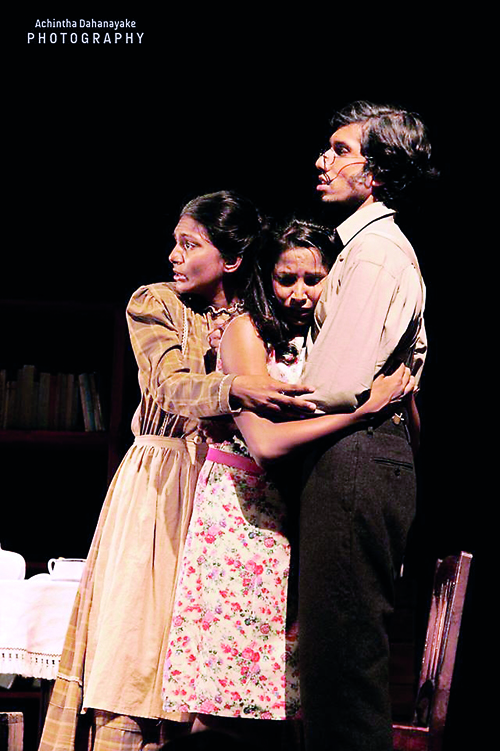Unmasking MassK
There are many reasons why I shouldn’t be writing about a play by Kaushalya Fernando. Firstly, I am not a drama critic (whether or not such a category exists in Sri Lanka is beside the point.) Secondly, she is a friend. And I admire her greatly for her courage to engage in art on her own terms, and that might influence what I have to say about this particular play. Also, she was born into a privileged family and has as a mother, a pioneer of Sinhala children’s drama, and therefore has many advantages that others might not, in the field of Sinhala theatre (as has been said of me when it comes to writing).
Yet, write about MassK, her newest play, an adaptation of Henrik Ibsen’s An Enemy of the People, I must. Apart from the fact that she is one of the very few (only?) female drama directors in Sri Lanka, the excellence of the play merits at least the briefest of mentions.
The choice of that play itself is creditworthy, for the relevance it has for the times we live in. It speaks truth to power. It also shows the fate of those who dare speak truth to power.
Kaushalya has adapted the play translated by Professor Sunanda Mahendra to quite a short form, and the lines spoken, therefore, are all the more striking. It is not possible to watch a play that has its most admirable and hunted character say something like, “Why would the majority be right? The majority is made up of stupid people” and not think in the darkness of a theatre in Sri Lanka, “Whoa!”
The story is about money, finally. It’s about power but then power is about money. Finally. It shows how even scientific fact, common sense apart, will be twisted, even if quite a few people will be dead at the cost of ignoring it, if it means that people will lose money by trying to follow its dictates. Of course, this applies to people who are wealthy to begin with, so an attack on the powerful classes underlies this play. But, more importantly, it also exposes the people who profess to oppose those with money and power, but do so only to further their own advancement in these very things.

A play that has to be seen. Pic by Achinta Dahanayake
That, though, is still about Ibsen’s script. About the production of MassK, first mention must be made of the actors who are all students of the Lanka Children’s and Youth Theatre Foundation, better known as Play House-Kotte, which was established as a voluntary organisation in 1981 by Mrs. Somalatha Subasinghe, the veteran playwright and theatre director. The cast of the play includes the youth artistes (2013 batch) who have successfully completed the Diploma Programme in Drama and Theatre at LCYTF conducted by Kaushalya Fernando and Prasanna Mahagamage. The Diploma programme entails all round training such as acting, script writing and analysis, directing, movement and vocal training, and the quality of the actors of MassK attest to the overall quality of the training programme. It was almost impossible to believe that the cast were all first time actors, such was their skill in acting, the consistency of their character portrayal down to the subtlest of hand movements, and the passion that they each put into their roles.
The director’s skill was apparent in how believable these people were. The hopeless idealism of some, the uptight stuffiness of the powerful and stupid – they were all carried on to the stage and then to the audience through voice, through costume, through gesture, through the mobility (or not) of faces. It was also apparent in the ease with which the scenes blended into each other, the actors’ themselves doubling as prop changers with the lights being used very effectively throughout.
There have been plays before that carried messages relevant to the times. I had played the violin at Dhawala Bheeshana, a translation of Men Without Shadows, where Kaushalya herself was also an actor, for which Premasiri Khemadasa did the music. On opening night, and on many nights following, such was the crowd that there were people sitting on the floor on the aisles, even at my feet as I sat where the orchestra was supposed to sit. For every comment on suppression, for every veiled reference to what was happening around us those days, there was a defending roar from the audience. Such was the power of theatre then. Such was the power and passion of the people.
But, at the 3.30 show at Punchi Theatre on January 25, there was only a handful of people downstairs. Have the reality shows and the tele-dramas, that hadn’t existed in the times of Dhawala Bheeshana, finally made us a nation of simpletons who are a joy to govern?
Thank goodness, then, that there are still people like Kaushalya Fernando, who have the power, through their art, to jolt us back into thinking. Who have the passion and dedication to believe that we deserve the amount of work necessary, to make us do so.
And all we have to do is, go and see it.


